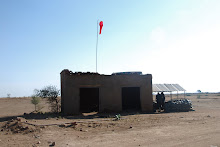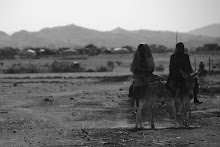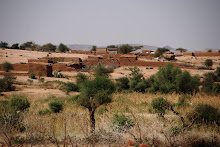The pace of change in Darfur has been blindingly fast over the past weeks - we’ve seen JEM take and then withdraw from Muhajeriya town, their flight and pursuit by GoS across a wide swath of Darfur, an alleged preemptive attack by JEM on the GoS stronghold on Malam, sustained bombardment of vast areas and a huge population movement, shifting alliances and surprise fighting between groups and former allies on the ground, peace talks beginning in Doha concurrently with a high level UN leak about the ICC warrant and subsequent denial by the ICC.
One theory holds that it has all been an accident – that the clash in Muhajeriya in mid-January which sparked the rest was an accidental escalation of a personal feud between two mid level commanders. Once the fighting started, JEM took the town and then didn’t know quite what to do with it.
Regardless of the reasons, the consequences have been enormous - and the disjointed response by peacekeepers and the international community has again shown that the intellectual challenges of peacekeeping are often far greater that the physical.
Two major consequences of the fighting have presented serious dilemmas to the mission. The first is the sudden and unexpected movement of thousands people from South Darfur (Muhajeriya, Sheria, Abu Dangal, and surrounding villages) to over-crowded camps in North Darfur. The second is the equally unexpected wave of shifting alliances which has left unclear who is in control of which territory and where things may lead.
The first priority is attending to the immediate food, shelter, hygiene, and medical needs of thousands of exhausted and dehydrated displaced. Yet the numbers and method of displacement has raised questions that may influence the way aid is delivered. The organization of the displaced - most have arrived on rented trucks packed with belongings – has caused speculation that the movement is a deliberate relocation of SLA/M supporters to areas of humanitarian relief to ensure provisions for the armed group as it looses territory. If the arrivals are a blatant ploy, how should humanitarians respond?
Additional speculation exists as to why the displaced have come so far north when there are closer camps and areas of refuge. It could be a natural tendency to displace towards kinship groups, or it could be a conscious return-migration - most of the new displaced are Zaghawa communities originally from North Darfur who relocated to the Muhajeriya area during a severe drought in 1973. In the latter case, their arrival could complicate the return process significantly. How should humanitarians assist communities who are potentially moving to reclaim old land they haven’t inhabited in 30 years?
On the political front, the first sign of shifting alliances was the surprise disarming if SLA/M (a partner in the government) by GoS discussed in my previous post, and the quick power changes continue to cause confusion. The movement of JEM fighters hundreds of miles from their bases in Chad to Muhajeriya and back again created suspicion between armed groups on the ground that one or the other was complicit in the attack. This tension is particularly apparent between GoS and SLA/M (the sole signatory of a peace agreement) combatants who have joint-control of some areas of Darfur. These suspicions have caused assassinations, proxy battles, and retaliation resulting in hundreds of deaths and a deterioration of confidence slowly built since the partnership was established in 2005.
The smaller, fringe rebel movements are shifting gears quickly trying to stay on the winning side of the battle, and many are hiring out to either side of the conflict. It is now unclear who controls large parts of North Darfur – including the volatile areas where humanitarian presence is most needed.
The uncertainty of what may happen in coming weeks has been reflected in the same-day announcement and denial of the decision to issue an ICC warrant for President Bashir. I believe the leak of the decision by the UN was deliberate. Because things are changing so quickly on the ground the UN does not want to situation to stabilize (with an agreement between GoS and JEM) and then be thrown off again by the warrant. I think the leak was intended to allow commanders to take the facts into consideration during the times of instability, so that a warrant won’t come as a shock.
Saturday, February 14, 2009
Sunday, February 1, 2009
A Military Ethic
UNAMID issued a strange denial yesterday of rumors claiming it had transported armed combatants from one place in Darfur to another. The denial was true, but barely – the combatants weren’t armed at the time they were transferred - and the incident illustrates the continued dominance of a military ethic over a civilian one within UNAMID which marginalizes civil society relative to armed groups in Darfur.
During the fighting in Muhajeriya in South Darfur earlier this month (in was has become a familiar seen in Congo, the Balkans and elsewhere) hundreds of civilians crowded around the UN base seeking protection from the cross-fire of battling JEM and SLA/M (Minni Minnawi) ground troops and later, GoS air bombardment.
The public details are fuzzy, but at some point GoS forces, having realized that the government-affiliated SLA/M troops would be defeated, intervened to forcibly disarm the group before JEM could acquire their weapons. Hundreds of disarmed and vulnerable ex-combatants (SLA/M) then arrived at the UNAMID compound seeking protection and were inexplicably given entry by the commanding officers of the base.
Despite the questionable legality of this move, once the men were inside, the mission was forced to care for them. The fighters were eventually transported by UNAMID helicopter with their consent to more friendly territory in Darfur.
There may have been some rationale behind the decision to admit the disarmed troops and not the civilians – 1) the combatants seeking protection were a smaller group than the civilian population and 2) the SLA/M combatants would more likely have been targeted by victorious JEM rebels - But the incident was clearly a violation of the fundamental principles of humanitarian law prioritizing the sanctity of civilian life in combat.
The series of decisions made during this crisis reveal the prioritization of military concerns over civilian ones within the Mission which has potentially contributed to militarization of the conflict.
The African Union mediated Darfur peace talks in Abuja in 2005 were widely criticized for giving armed factions a much larger seat at the negotiating table than unarmed civil society groups. Since these talks there has been an effort to include civil society in various peace initiatives, but partiality towards armed groups continues on the ground.
UNAMID civilian staff are limited to permanent deployment in the three Darfur capitals while UNAMID military are deployed widely at team sites across the states. The UNAMID military staff on the ground often forge stronger relations with the armed combatants within their area of responsibility, than the civilians. UNAMID commanders develop relationships with rebel and army commanding officers, and rely on each other for information, protection, and logistical arrangements
When an incident of note occurs, civilian staff may conduct 1, 2 or 3 day field mission to the team sites where they interact with a wide variety of civilians. But without being on the ground permanently, UNAMID civilian staff are unable to build lasting relationships with teachers, doctors, artisans, police, local leaders and others.
The majority of information received and disseminated by UNAMID is skewed towards armed groups and filtered through the relations of armed actors on the ground. When calls for more peacekeepers are made in the international press, it must be noted that these “peacekeepers” are not experts in humanitarian law, and their presence on the ground may actually elevate military over civilian actors in the conflict.
More troops may not be the answer – but rather a new focus on building functioning and lasting relations with a cross-section of Darfur society and the deployment of civilian staff more widely.
During the fighting in Muhajeriya in South Darfur earlier this month (in was has become a familiar seen in Congo, the Balkans and elsewhere) hundreds of civilians crowded around the UN base seeking protection from the cross-fire of battling JEM and SLA/M (Minni Minnawi) ground troops and later, GoS air bombardment.
The public details are fuzzy, but at some point GoS forces, having realized that the government-affiliated SLA/M troops would be defeated, intervened to forcibly disarm the group before JEM could acquire their weapons. Hundreds of disarmed and vulnerable ex-combatants (SLA/M) then arrived at the UNAMID compound seeking protection and were inexplicably given entry by the commanding officers of the base.
Despite the questionable legality of this move, once the men were inside, the mission was forced to care for them. The fighters were eventually transported by UNAMID helicopter with their consent to more friendly territory in Darfur.
There may have been some rationale behind the decision to admit the disarmed troops and not the civilians – 1) the combatants seeking protection were a smaller group than the civilian population and 2) the SLA/M combatants would more likely have been targeted by victorious JEM rebels - But the incident was clearly a violation of the fundamental principles of humanitarian law prioritizing the sanctity of civilian life in combat.
The series of decisions made during this crisis reveal the prioritization of military concerns over civilian ones within the Mission which has potentially contributed to militarization of the conflict.
The African Union mediated Darfur peace talks in Abuja in 2005 were widely criticized for giving armed factions a much larger seat at the negotiating table than unarmed civil society groups. Since these talks there has been an effort to include civil society in various peace initiatives, but partiality towards armed groups continues on the ground.
UNAMID civilian staff are limited to permanent deployment in the three Darfur capitals while UNAMID military are deployed widely at team sites across the states. The UNAMID military staff on the ground often forge stronger relations with the armed combatants within their area of responsibility, than the civilians. UNAMID commanders develop relationships with rebel and army commanding officers, and rely on each other for information, protection, and logistical arrangements
When an incident of note occurs, civilian staff may conduct 1, 2 or 3 day field mission to the team sites where they interact with a wide variety of civilians. But without being on the ground permanently, UNAMID civilian staff are unable to build lasting relationships with teachers, doctors, artisans, police, local leaders and others.
The majority of information received and disseminated by UNAMID is skewed towards armed groups and filtered through the relations of armed actors on the ground. When calls for more peacekeepers are made in the international press, it must be noted that these “peacekeepers” are not experts in humanitarian law, and their presence on the ground may actually elevate military over civilian actors in the conflict.
More troops may not be the answer – but rather a new focus on building functioning and lasting relations with a cross-section of Darfur society and the deployment of civilian staff more widely.
Subscribe to:
Comments (Atom)












































